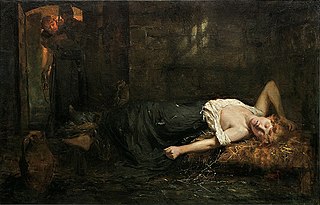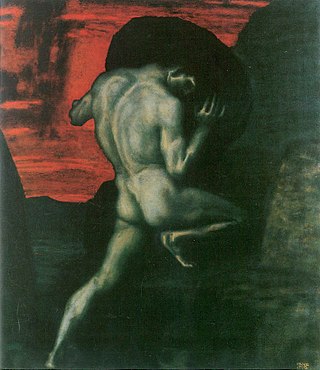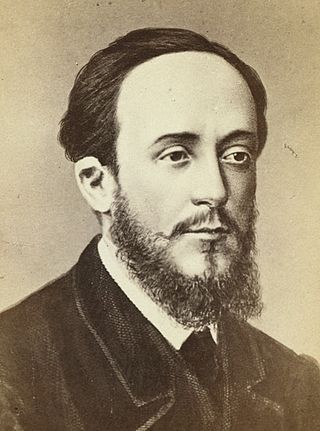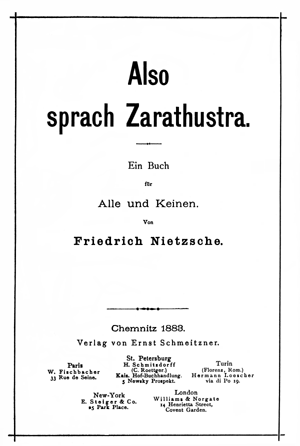Egoism is a philosophy concerned with the role of the self, or ego, as the motivation and goal of one's own action. Different theories of egoism encompass a range of disparate ideas and can generally be categorized into descriptive or normative forms. That is, they may be interested in either describing that people do act in self-interest or prescribing that they should. Other definitions of egoism may instead emphasise action according to one's will rather than one's self-interest, and furthermore posit that this is a truer sense of egoism.

Nihilism is a philosophy, or family of views within philosophy, that rejects generally accepted or fundamental aspects of human existence, such as objective truth, knowledge, morality, values, or meaning. The term was popularized by Ivan Turgenev, and more specifically by his character Bazarov in the novel Fathers and Sons.

Pessimism is a negative mental attitude in which an undesirable outcome is anticipated from a given situation. Pessimists tend to focus on the negatives of life in general. A common question asked to test for pessimism is "Is the glass half empty or half full?"; in this situation, a pessimist is said to see the glass as half empty, while an optimist is said to see the glass as half full. Throughout history, the pessimistic disposition has had effects on all major areas of thinking.
Constructivism may refer to:

Absurdism is the philosophical theory that existence in general is absurd. This implies that the world lacks meaning or a higher purpose and is not fully intelligible by reason. The term "absurd" also has a more specific sense in the context of absurdism: it refers to a conflict or a discrepancy between two things but there are several disagreements about their exact nature. These disagreements have various consequences for whether absurdism is true and for the arguments cited in favor and against it. Popular accounts characterize the conflict as a collision between rational man and an irrational universe, between intention and outcome, or between subjective assessment and objective worth. An important aspect of absurdism is its claim that the world as a whole is absurd. It differs in this regard from the uncontroversial and less global thesis that some particular situations, persons, or phases in life are absurd.

Dmitry Ivanovich Pisarev was a Russian literary critic and philosopher who was a central figure of Russian nihilism. He is noted as a forerunner of Nietzschean philosophy and for the impact his advocacy of liberation movements and natural science had on Russian history.

Moral nihilism is the meta-ethical view that nothing is morally right or wrong.

The Russian nihilist movement was a philosophical, cultural, and revolutionary movement in the Russian Empire during the late 19th and early 20th centuries, from which the broader philosophy of nihilism originated. In Russian, the word nigilizm came to represent the movement's unremitting attacks on morality, religion, and traditional society. Even as it was yet unnamed, the movement arose from a generation of young radicals disillusioned with the social reformers of the past, and from a growing divide between the old aristocratic intellectuals and the new radical intelligentsia.

This glossary of philosophy is a list of definitions of terms and concepts relevant to philosophy and related disciplines, including logic, ethics, and theology.

In ethics, intrinsic value is a property of anything that is valuable on its own. Intrinsic value is in contrast to instrumental value, which is a property of anything that derives its value from a relation to another intrinsically valuable thing. Intrinsic value is always something that an object has "in itself" or "for its own sake", and is an intrinsic property. An object with intrinsic value may be regarded as an end, or in Kantian terminology, as an end-in-itself.

Transmodernism is a philosophical and cultural movement founded by Argentinian-Mexican philosopher Enrique Dussel. He refers to himself as a transmodernist and wrote a series of essays criticising the postmodern theory and advocating a transmodern way of thinking. Transmodernism is a development in thought following the period of postmodernism; as a movement, it was also developed from modernism, and, in turn, critiques modernity and postmodernity, viewing them as the end of modernism.

Friedrich Nietzsche (1844–1900) developed his philosophy during the late 19th century. He owed the awakening of his philosophical interest to reading Arthur Schopenhauer's Die Welt als Wille und Vorstellung and said that Schopenhauer was one of the few thinkers that he respected, dedicating to him his essay Schopenhauer als Erzieher, published in 1874 as one of his Untimely Meditations.
Speculative realism is a movement in contemporary Continental-inspired philosophy that defines itself loosely in its stance of metaphysical realism against its interpretation of the dominant forms of post-Kantian philosophy.
David Benatar is a South African philosopher, academic and author. He is best known for his advocacy of antinatalism in his book Better Never to Have Been: The Harm of Coming into Existence, in which he argues that coming into existence is a serious harm, regardless of the feelings of the existing being once brought into existence, and that, as a consequence, it is always morally wrong to create more sentient beings.

Russian philosophy is a collective name for the philosophical heritage of Russian thinkers.

Existential nihilism is the philosophical theory that life has no intrinsic meaning or value. With respect to the universe, existential nihilism suggests that a single human or even the entire human species is insignificant, without purpose and unlikely to change in the totality of existence. According to the theory, each individual is an isolated being born into the universe, barred from knowing 'why'. The inherent meaninglessness of life is largely explored in the philosophical school of existentialism, where one can potentially create their own subjective 'meaning' or 'purpose'. Of all types of nihilism, existential nihilism has received the most literary and philosophical attention.

The paradox of nihilism is a family of paradoxes regarding the philosophical implications of nihilism, particularly situations contesting nihilist perspectives on the nature and extent of subjectivity within a nihilist framework. There are a number of variations of this paradox.
Cynicism is an attitude characterized by a general distrust of the motives of "others". A cynic may have a general lack of faith or hope in people motivated by ambition, desire, greed, gratification, materialism, goals, and opinions that a cynic perceives as vain, unobtainable, or ultimately meaningless and therefore deserving of ridicule or admonishment. The term originally derives from the ancient Greek philosophers, the Cynics, who rejected conventional goals of wealth, power, and honor. They practiced shameless nonconformity with social norms in religion, manners, housing, dress, or decency, instead advocating the pursuit of virtue in accordance with a simple and natural way of life.

An anti-nihilistic novel is a form of novel from late 19th-century Russian literature, that came as a reaction to the disillusioned attitudes of the Russian nihilist movement and revolutionary socialism of the 1860s and 1870s. The genre was influential in shaping subsequent ideas on nihilism as a philosophy and cultural phenomenon. Its name derives from the historical usage of the word nihilism as broadly applied to revolutionary movements within the Russian Empire at the time.








